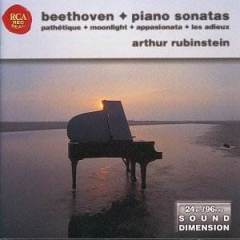Beethoven - Sonatas: Moonlight ∙ Les Adieux ∙ Pathétique ∙ Appassionata (Rubinstein) [2006]
Beethoven - Sonatas: Moonlight ∙ Les Adieux ∙ Pathétique ∙ Appassionata (Rubinstein) [2006]

Sonata No. 14 In C-Sharp Minor, Op. 27, No. 2 ("Moonlight")
1 1. Adagio Sostenuto 6:13
2 2. Allegretto 2:40
3 3. Presto Agitato 6:45
Sonata No. 26 In E-Flat, Op. 81a ("Les Adieux")
4 1. Adagio, Allegro 7:42
5 2. Andante Espressiva 3:24
6 3. Vivacissimamente 5:40
Sonata No. 8 In C-Minor, Op. 13 ("Pathétique")
7 1. Allegro Di Molto E Con Brio 8:49
8 2. Adagio Cantabile 5:41
9 3. Rondo: Allegro 4:49
Sonata No. 23 In F Minor, Op. 57 "Appassionata"
10 1. Allegro Assai 9:29
11 2. Andante Con Moto 6:32
12 3. Allegro Ma Non Troppo 7:57
Artur Rubinstein - piano
Recorded 1962 (opp. 13, 27/2, 81a), 1963 (op. 57)
While EMI, Decca and the BBC bring out their "Legends" and their "Great Recordings of the 20th Century", BMG give us a compilation of most of Rubinstein’s Beethoven sonata interpretations (he was of the generation that mostly stuck to the famous sonatas with names, though he was also a wonderful exponent of op. 31/3) in a series aimed basically at first-time classical buyers. If Rubinstein was not always considered a Beethoven interpreter par excellence, novices will encounter the music in the hands of one of the 20th Century’s great communicators; far better this than a barely competent animal going through the traditional motions. They will also find a brief note explaining "Viennese Classical Music" (sorry, "viennese classical music": who started all this nonsense about titles in small letters, and isn’t it about time it stopped? CD Booklets aren’t poems by e.e. cummings; would they were!), "beethoven’s" piano sonatas and the sonatas in question. All very listener-friendly but not reductively so. My only real niggle is that the writer seems to have expectations of more traditional interpretation than those on the record. They will also get a brief note on the pianist, and will learn that in 1916-17 he gave over 100 concerts in Spain "and became one of the most important interpreters of Spanish music". If they don’t already know that he played Chopin rather often, they won’t learn that here.
Any suspicions that Rubinstein might prove unduly avuncular in Beethoven are practically dispelled by the first chord of the "Pathétique". Also dispelled are any worries one might have about the recording. I don’t know where that close, clattery sound we always used to think part and parcel of Rubinstein’s recordings has gone, for I’ve never heard him sound so warm and rich on record, or so close to the sound I remember from the one occasion (alas!) on which I heard him live. True, the "Appassionata" from a year later is a little harder, but without the comparison I would have found little to fault in it. There will be rejoicing in heaven over this.
It could perhaps have been taken for granted that Rubinstein would be a wonderfully songful interpreter of all four slow movements, rich in sonority, detailed and natural in phrasing, alive to contrapuntal movement in the bass lines and inner parts. He is also one of the few who can really say something with the middle movement of the "Moonlight", often thrown away as a bland intermezzo.
It might also have been expected that he would take his time over the outer movements, but thanks to the fullness of his tone (every note on the CD tells) and the clarity of his left-hand work (you will hear whole passages in all finales in which he prefers crystalline detail where others give us a blur of pedal), the true Beethovenian drive is emphatically present. As a result of not rushing his fences in the "Appassionata" finale, the presto, when it arrives, is overwhelming. He also uncovers much detail in the first movements. Who else has made the exchanges between the lower and upper registers (right-hand crossing over left) in the second subject of op. 13 speak like this? You can imagine an operatic duet between soprano and baritone. Only in the first movement of "Les Adieux" did I feel that perhaps he was taking things a little comfortably, though with much insightful phrasing.
If Rubinstein still seems a not entirely orthodox Beethoven interpreter, it is because he remained a romantic artist dedicated to telling a story rather than expounding a structure. This may not necessarily be wrong, but our Beethovenian clocks were set by Schnabel in the 1930s and basically our expectations have remained in line with this ever since. Rubinstein learnt his Beethoven before the Schnabel revolution. However, while even the most highly-esteemed pre-Schnabel interpreters sound odd to present-day ears, Rubinstein was not only an intuitive and a romantic pianist, he was also a highly intelligent one with a great respect for the printed score.
So, to get back to my first point, first–timers will encounter this music in richly communicative performances. But I hope circulation of this disc will not stop there. Anyone with a fair stock of "conventional" Beethoven, not to speak of collectors of "Legends" who did not buy these as part of the Rubinstein edition, should get them now. Beethoven speaks to all men in many ways, and there will be times when Rubinstein’s very human way will bring the music closer to you than any other. ---Christopher Howell, musicweb-international.com
download (mp3 @320 kbs):








